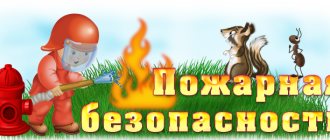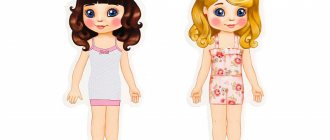Card file of conversations with children of middle preschool age on the topic “Rules of Etiquette”
Victoria Gunkina
Card file of conversations with children of middle preschool age on the topic “Rules of Etiquette”
Summary of a conversation with children 3–5 years old on the formation of a group of children “Let's teach Mishutka the magic words: “thank you” and “please”
Goal: to consolidate children’s knowledge of the rules and norms of communication.
A surprise moment: Mishutka’s visit.
Demonstration material: teddy bear toy.
Educator: Guys, look, a bear cub named Mishutka came to visit us. Let's say hello to him. Well done!
Our Mishutka is a very inquisitive little bear and wants to know what magic word needs to be said in order to ask for something?
Children's answer.
Educator: That’s right, the word “please”, well done!
What should you say when someone gave you something or did something good or helped you in some way?
Children's answer.
Educator: Well done, of course “thank you”! When someone has done something good for you, you need to thank them with the magic word “thank you.”
What other polite words do you know?
Children's answer.
Educator: Guys, let's tell Mishutka all the rules of polite communication.
What basic rules of speech etiquette do we know?
Children's answer:
- be sure to say the greeting “hello” when meeting with familiar people, and “goodbye” at the end of the meeting;
-when you sit down at the table you need to wish everyone “bon appetit”; when you leave the table after eating, we say “thank you”;
- address adults as “you”;
- do not interrupt when someone is speaking, you need to wait until the speaker finishes his speech;
-You shouldn’t snitch or call people names.
Educator: Well done! The rules of etiquette are magical rules of behavior; knowing and following them, you will never find yourself in an uncomfortable situation. You will always look polite and well-mannered.
Mishutka says “thank you!” and says goodbye to us “goodbye!”
KGN. Summary of the conversation on the topic “Let’s tell Aunt Snail how to behave at the table”
Goal: to consolidate children's knowledge of the rules and norms of behavior at the table.
A surprise moment: Aunt Snail’s visit.
Demonstration material: toy – Snail.
Educator: Guys, today Aunt Snail came to visit us. Let's, while they are setting our tables for afternoon tea, tell Auntie Snail the rules of behavior at the table.
Questions:
1. What should you do before eating? (you need to wash your hands before eating)
2. What should you do at the beginning of the meal? (wish everyone present at the table bon appetit)
3. How do we sit at the table? (we sit upright, the back is straight, we don’t put our elbows on the table)
4. Is it possible to take food from a plate with your hands? (special cutlery should be used for eating)
5. Is it possible to talk and play around at the table while eating? (we eat in silence, it is forbidden to slurp, crunch loudly, remove food stuck in the teeth with your fingers, it is forbidden to indulge at the table. You should eat with your mouth closed)
6. What should you do if you get a large piece of food? Can you stuff it whole into your mouth? (you can’t stuff your mouth full of food; if you come across large pieces of food, divide them into small ones using cutlery.
7. Is it possible to lick the plate, even if it was very tasty? (no, you can’t lick the plate)
8. If someone gets dirty, what should they do? (if necessary, use a napkin)
9. And the last question, when we have eaten, what do we do? (you need to wipe your mouth and hands with a napkin, and when getting up from the table say “thank you!”)
Educator: Well done! Aunt Snail is very glad that you remember the rules of behavior at the table well and it’s time for her to crawl into her house. Goodbye!
The table is already set, we washed our hands, now we take chairs and sit down in our places, first the girls, now the boys.
Summary of a conversation with children 3–5 years old on the formation of a group of children “Guests came to the doll Katya”
Goal: to consolidate children’s knowledge of the rules and norms of behavior when visiting.
Demonstration material: doll table with chairs, toy dishes, three dolls.
Option #1.
Educator: Guys, let's play. Help me set the table, 2 friends will come to visit our doll Katya: doll Olya and doll Dasha.
Children set a table for three people, arrange cups, plates, a teapot and napkins.
Educator: Katya invited her friends Olya and Dasha to visit for afternoon tea.
Olya and Dasha knocked on the door, Katya opened the door for them (They said hello) - “Hello Katya!” Katya: Hello! Come on in! Have a seat! - The dolls sat down at the table and began to talk. Katya offered to drink tea. Dasha and Olya drank tea and thanked Katya. We sat a little longer and went home. When leaving, Olya and Dasha said goodbye to Katya, “Goodbye!” Katya answered them: “Goodbye!”
Educator: Guys, we’ve played with the dolls, and now let’s discuss how the dolls behaved at a party, good or bad?
Children's answers: Good!
Question: Did Katya invite Dasha and Olya? Is it possible to visit without an invitation?
Children's answers: Katya invited Olya and Dasha (you cannot visit without an invitation).
Question: Is it possible to be late or arrive before the time you were invited to?
Children's answer: No!
Question: When they met, did they say hello?
Children's answer: Yes! Olya and Dasha said, “Hello Katya!” And Katya also greeted them.
Question: How did Olya and Dasha behave at a party? Were they playing around and shouting?
Children's answer: No, they behaved well, sat quietly and talked calmly.
Question: Is it possible to interrupt during a conversation?
Children's answer: No! When speaking, you should not interrupt other people.
Question: Were Olya and Dasha visiting for a long time?
Children's answer: No!
Question: Is it possible to stay at a party for a long time? Is it beautiful?
Children's answer: No! You can't stay up late at a party. It's not beautiful.
Question: When Olya and Dasha left, did they say goodbye to Katya?
Children's answer: Yes!
Question: Did Katya say goodbye to the guests and say “goodbye!”?
Children's answer: Yes, Katya, she also said “goodbye!”
Educator: You remember everything, now say - “Did Olya and Dasha behave well when visiting Katya?”
Children: Yes!
Educator: Guys, what other rules of behavior at a party do you know that we haven’t talked about now?
Children's answer:
- you cannot ask for tea or treats;
- You should only go on a visit in a good mood.
Educator: Correct! You, too, like our dolls, know well the rules of behavior when visiting! Well done!
Option #2.
Play with the children the opposite picture of behavior and discuss: What is good? What is wrong? How should you behave when visiting?
Summary of a conversation with children 3–5 years old on the formation of the group “Rules of etiquette in a public place”
Goal: to consolidate children’s knowledge of the rules and norms of communication.
Surprise moment: Magic chest.
Demonstration material: a beautiful box (magic chest) with notes and questions, homemade paper medals according to the number of children.
Educator: Guys, look what I brought you! This is a magic chest with a secret. Want to know what's there?
Children's answer: Yes!
Educator: To find out what the secret is, we need to answer the questions that are in the note. There will be questions about how to behave around strangers, in public places such as a store, theater, museum, transport and even a children's playground, we will talk now.
Rules of behavior in public places are, first of all, basic politeness.
1. If you have a runny nose, what should you do?
Children's answer: use a handkerchief.
2. Well-mannered children, what do they do when they cough and sneeze?
Children's answer: When coughing and sneezing, it is customary to cover your mouth.
3. Well done! Before entering a vehicle or store, what should you do first?
Children's answer: you should first make way for those leaving.
4. When you are eating on public transport, if you are sitting and an elderly person, grandma or grandpa, is standing next to you, what will you do?
Children's answer: in transport you should give up your seat to elders.
5. That's right, we should be polite to adults. Be attentive to people with disabilities.
Next question: Is it possible to talk loudly in public places?
Children's answer: No. It is prohibited to talk loudly, shout, or sing songs in public places.
6. Well done, right! New question: is it possible to enter public transport or a store or museum with food?
Children's answer: No. You cannot enter transport, shops or other public places with food or drinks.
7. That’s right, the boy threw a piece of candy on the playground, is it possible to do that?
Children's answer: No! You cannot litter, you must maintain cleanliness.
8. Great, but you also need to take care of green spaces and not destroy flowers, bushes and trees. Another question: someone left a toy on the playground, can I take it back?
Children's answer: No!
9. Of course you can’t, you’re right, no matter how much you want to do it, you should never take other people’s things! After all, firstly, it may turn out to be dangerous (an explosive device, and secondly, when the child returns for his toy or thing and it is not there, he will be very upset. But here’s the question: is it possible to swear, fight, spit?
Children's answer: no, you can't!
10. That’s right, you can’t behave like that. We also need to help the small, weak and defenseless. And the last question: is it possible to interrupt people who are speaking?
Children's answer: No! You can't interrupt other people.
Right! Well done, it's not pretty! It’s still not nice to point a finger.
Guys, there are still many rules that we haven’t talked about today, but we’ll definitely repeat them next time. All these rules converge on one thing - you need to be kind and polite. You must always follow the rules of etiquette and then you can grow up to be good, kind people worthy of respect.
And I want to thank you by giving you what is in our magic chest. The teacher distributes prepared medals “For Politeness” to all children.



